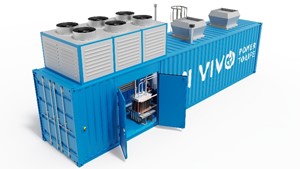News
IMI Critical Engineering launches a PEM electrolyzer, generating green H2 from renewable energy
With experts predicting that H2 uptake must triple to meet global decarbonization targets, IMI Critical Engineering has expanded its technology portfolio and launched a proton exchange membrane (PEM) electrolyzer that generates green H2 from renewable energy sources.
Certification experts DNV have recently warned that H2 will only make up 5% of the worldwide energy mix by 2050. This falls far below the 15% requirement defined in the 2015 Paris Agreement, which formed part of a wider commitment to transform the global energy landscape by 2050 to keep rising global temperatures below 2°C.
According to engineering specialists IMI Critical Engineering, the development and uptake of green H2 solutions, which use renewable energy to transform water into H2, will be key to hitting the Paris Agreement targets. To support the industrial adoption of H2 energy, the company has launched the new IMI VIVO Electrolyzer, which passes an electric current through water via a membrane, breaking it down into H2 and oxygen.
Giuseppe Buscemi, President of IMI Critical Engineering, Europe said, “Hydrogen created from green energy sources such as wind, solar, or geothermal energy is increasingly regarded as a crucial part of our transition to a sustainable future. Yet though previous International Energy Agency reports have predicted it will grow to 18% of the energy mix by 2050, the latest DNV research makes for troubling reading.
“The importance of electrolyzers therefore cannot be overstated, as they will be vital in ensuring the world fully realizes the potential of hydrogen. We expect the technology to play a pivotal role in decarbonizing certain manufacturing sectors that cannot be electrified, which is why we have launched the new IMI VIVO Electrolyzer. This new system, which provides green hydrogen, will allow wider uptake of sustainable energy generation solutions and help create a better world by keeping us on track with Paris Agreement targets.”
The company’s new PEM electrolyzer uses a turnkey configuration that can be adapted to customer specifications, and includes a fuel cell, storage system and electrolyzer as standard. It is already being used across research facilities, including a Russell Group university in England which is assisting IMI Critical Engineering’s ongoing research into eco-fuels and green technologies.
Buscemi concluded, “We began developing the IMI VIVO Electrolyzer in 2020, as part of the company’s accelerator program to identify and create solutions to assist the energy transition. IMI’s purpose is Breakthrough Engineering for a better world, and this new solution demonstrates that commitment in action. By combining our engineering capabilities with innovative technologies, we can work with our customers to make the world safer, cleaner, and greener.”


